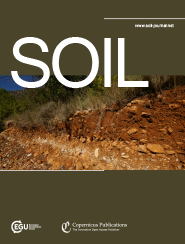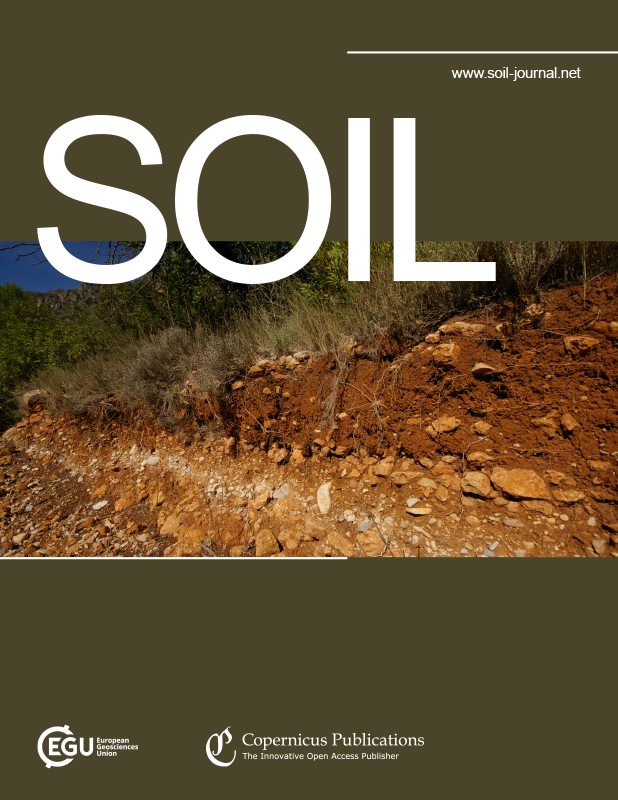Executive editors: Rémi Cardinael, Peter Fiener, Engracia Madejón Rodríguez, Raphael Viscarra Rossel & Jeanette Whitaker
eISSN: SOIL 2199-398X, SOILD 2199-3998
SOIL is a not-for-profit international scientific journal dedicated to the publication and discussion of high-quality research in the field of soil system sciences.
SOIL is at the interface between the atmosphere, lithosphere, hydrosphere, and biosphere. SOIL publishes scientific research that contributes to understanding the soil system and its interaction with humans and the entire Earth system. The scope of the journal includes all topics that fall within the study of soil science as a discipline, with an emphasis on studies that integrate soil science with other sciences (hydrology, agronomy, socio-economics, health sciences, atmospheric sciences, etc.).
Journal metrics
SOIL is indexed in the Web of Science, Scopus, Google Scholar, etc. We refrain from displaying the journal metrics prominently on the landing page since citation metrics used in isolation do not describe importance, impact, or quality of a journal. However, these metrics can be found on the journal metrics page.
04 Jul 2025
A quantitative assessment of the behavior of metallic elements in urban soils exposed to industrial dusts near Dunkerque (northern France)
Marine Casetta, Sylvie Philippe, Lucie Courcot, David Dumoulin, Gabriel Billon, François Baudin, Françoise Henry, Michaël Hermoso, and Jacinthe Caillaud
SOIL, 11, 467–488, https://doi.org/10.5194/soil-11-467-2025,https://doi.org/10.5194/soil-11-467-2025, 2025
Short summary
01 Jul 2025
Soil health approaches to assess the impacts of no-tillage with agricultural terraces in southern Brazil
Ariane Lentice de Paula, Luis Miguel Schiebelbein, Regiane Kazmierczak Becker, Eduardo Augusto Agnellos Barbosa, Fabrício Tondello Barbosa, Carolina Weigert Galvão, Rafael Mazer Etto, Heverton Fernando Melo, Adriel Ferreira da Fonseca, and Neyde Fabiola Balarezo Giarola
EGUsphere, https://doi.org/10.5194/egusphere-2025-2583,https://doi.org/10.5194/egusphere-2025-2583, 2025
Preprint under review for SOIL (discussion: open, 0 comments)
Short summary
25 Jun 2025
Long-term pig manure application increases soil organic carbon through aggregate protection and Fe-carbon associations in a subtropical Red soil (Udic Ferralsols)
Hui Rong, Zhangliu Du, Weida Gao, Lixiao Ma, Xinhua Peng, Yuji Jiang, Demin Yan, and Hu Zhou
EGUsphere, https://doi.org/10.5194/egusphere-2025-2405,https://doi.org/10.5194/egusphere-2025-2405, 2025
Preprint under review for SOIL (discussion: open, 0 comments)
Short summary
Highlight articles
12 Jun 2025
Using 3D observations with high spatio-temporal resolution to calibrate and evaluate a process-focused cellular automaton model of soil erosion by water
Anette Eltner, David Favis-Mortlock, Oliver Grothum, Martin Neumann, Tomáš Laburda, and Petr Kavka
SOIL, 11, 413–434, https://doi.org/10.5194/soil-11-413-2025,https://doi.org/10.5194/soil-11-413-2025, 2025
Short summary
05 May 2025
Missing the input: the underrepresentation of plant physiology in global soil carbon research
Sajjad Raza, Hannah V. Cooper, Nicholas T. Girkin, Matthew S. Kent, Malcolm J. Bennett, Sacha J. Mooney, and Tino Colombi
SOIL, 11, 363–369, https://doi.org/10.5194/soil-11-363-2025,https://doi.org/10.5194/soil-11-363-2025, 2025
Short summary
29 Apr 2025
The clay mineralogy rather than the clay content determines radiocaesium adsorption in soils on a global scale
Margot Vanheukelom, Nina Haenen, Talal Almahayni, Lieve Sweeck, Nancy Weyns, May Van Hees, and Erik Smolders
SOIL, 11, 339–362, https://doi.org/10.5194/soil-11-339-2025,https://doi.org/10.5194/soil-11-339-2025, 2025
Short summary
11 Apr 2024
Unraveling biogeographical patterns and environmental drivers of soil fungal diversity at the French national scale
Christophe Djemiel, Samuel Dequiedt, Walid Horrigue, Arthur Bailly, Mélanie Lelièvre, Julie Tripied, Charles Guilland, Solène Perrin, Gwendoline Comment, Nicolas P. A. Saby, Claudy Jolivet, Antonio Bispo, Line Boulonne, Antoine Pierart, Patrick Wincker, Corinne Cruaud, Pierre-Alain Maron, Sébastien Terrat, and Lionel Ranjard
SOIL, 10, 251–273, https://doi.org/10.5194/soil-10-251-2024,https://doi.org/10.5194/soil-10-251-2024, 2024
Short summary

More highlight articles  All EGU highlight articles
All EGU highlight articles 
News
04 Jul 2025
Get involved, become a referee, and help shape SOIL's community publication output
We are pleased to announce that a new referee application form is now available. This means that if you are interested in contributing to the peer-review process and supporting high-quality scientific publishing in your community then you can apply today to become a referee. Your expertise can make a difference. Visit the online form here to learn more and join our reviewer community. 
04 Jul 2025
Get involved, become a referee, and help shape SOIL's community publication output
We are pleased to announce that a new referee application form is now available. This means that if you are interested in contributing to the peer-review process and supporting high-quality scientific publishing in your community then you can apply today to become a referee. Your expertise can make a difference. Visit the online form here to learn more and join our reviewer community. 


20 May 2025
SOIL topic editor Katerina Georgiou received the 2025 Soil System Sciences Division Outstanding Early Career Scientist Award
During the EGU General Assembly 2025, SOIL's topic editor Katerina Georgiou was honoured with the Soil System Sciences Division Outstanding Early Career Scientist Award. Her research has significantly advanced our understanding of carbon cycling. By developing innovative theoretical and mathematical frameworks for soil biogeochemical processes, she has provided critical new insights into carbon dynamics and the global potential for soil carbon sequestration. The executive editors extend their warmest congratulations to Katerina on this well-deserved recognition. We are proud and grateful to have her expertise on our editorial board. 
20 May 2025
SOIL topic editor Katerina Georgiou received the 2025 Soil System Sciences Division Outstanding Early Career Scientist Award
During the EGU General Assembly 2025, SOIL's topic editor Katerina Georgiou was honoured with the Soil System Sciences Division Outstanding Early Career Scientist Award. Her research has significantly advanced our understanding of carbon cycling. By developing innovative theoretical and mathematical frameworks for soil biogeochemical processes, she has provided critical new insights into carbon dynamics and the global potential for soil carbon sequestration. The executive editors extend their warmest congratulations to Katerina on this well-deserved recognition. We are proud and grateful to have her expertise on our editorial board. 
Notice on the current situation in Ukraine
To show our support for Ukraine, all fees for papers from authors (first or corresponding authors) affiliated to Ukrainian institutions are automatically waived, regardless if these papers are co-authored by scientists affiliated to Russian and/or Belarusian institutions. The only exception will be if the corresponding author or first contact (contractual partner of Copernicus) are from a Russian and/or Belarusian institution, in that case the APCs are not waived.
In accordance with current European restrictions, Copernicus Publications does not step into business relations with and issue APC-invoices (articles processing charges) to Russian and Belarusian institutions. The peer-review process and scientific exchange of our journals including preprint posting is not affected. However, these restrictions require that the first contact (contractual partner of Copernicus) has an affiliation and invoice address outside Russia or Belarus.





